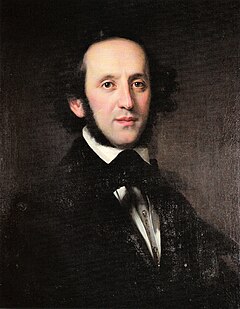Lobgesang
| Lobgesang | |
|---|---|
| Choral symphony by Felix Mendelssohn | |
 Mendelssohn in 1846 | |
| English | Hymn of Praise |
| Other name | Symphony No. 2 |
| Key | B-flat major |
| Catalogue | MWV A 18 |
| Opus | 52 |
| Occasion | 400th anniversary of printing |
| Text | Psalms, other biblical verses, "Nun danket alle Gott" |
| Language | German |
| Composed | 1840 |
| Performed | 25 June 1840 |
| Movements | 10 |
| Scoring |
|
| External audio | |
|---|---|
Here on Archive.org |
Lobgesang (Hymn of Praise), Op. 52 (MWV A 18[1]), is an 11-movement "Symphony-Cantata on Words of the Holy Bible for Soloists, Choir and Orchestra" by Felix Mendelssohn. After the composer's death it was published as his Symphony No. 2 in B-flat major, a naming and a numbering that are not his. The required soloists are two sopranos and a tenor. The work lasts almost twice as long as any of Mendelssohn's purely instrumental symphonies.
History
It was composed in 1840, along with the less-known Festgesang "Gutenberg Cantata", to celebrate the 400th anniversary of the invention of Johannes Gutenberg's movable type printing system.
In 1842 Mendelssohn had published his Scottish Symphony as "Symphony No. 3", however a "Symphony No. 2" had never been published during Mendelssohn's lifetime. Possibly the composer's intention was to spare this number for his earlier Italian Symphony, which he premiered in 1833, but afterwards withheld for a revision that was never completed. The Italian Symphony was published posthumously as "Symphony No. 4". Decades after Mendelssohn's death, the editors of the old Mendelssohn complete edition entered Lobgesang as "No. 2" in the sequence of the symphonies for editorial reasons.[1] However, there is no indication that this represented the composer's intentions. The new Mendelssohn-Werkverzeichnis (MWV), published in 2009 by the Saxon Academy of Sciences and Humanities, no longer lists Lobgesang among the symphonies, but rather among the sacred vocal works.[1][2]
Structure
Structurally, it consists of three purely orchestral movements followed by 10[3] movements for chorus and/or soloists and orchestra, and lasts approximately 65–75 minutes in total. The English titles of the movements are:
- Sinfonia:
- Maestoso con moto - Allegro
- Allegretto un poco agitato
- Adagio religioso
- All men, all things, all that have life and breath (chorus)
- Let everything that has breath praise the Lord (soprano and semi-chorus)[n 1]
- Sing ye Praise (tenor recitative and aria)
- All ye that cried unto the Lord (chorus)
- I waited for the Lord (soprano duet and chorus)
- The sorrows of Death (tenor Aria)
- The Night is Departing (chorus)
- Let all men praise the Lord (chorale, "Nun danket alle Gott")
- My song shall be always Thy Mercy (soprano and tenor duet)
- Ye nations, offer to the Lord (chorus)
The now-standard harmonisation of "Nun danket alle Gott" by Martin Rinkart (1636) was devised by Felix Mendelssohn in 1840 when he adopted the hymn, sung in the now-standard key of G major and with its original German lyrics of stanzas 1 and three, as the chorale to Lobgesang.
Instrumentation
The symphony is scored for two sopranos, tenor, chorus, two flutes, two oboes, two clarinets, two bassoons, four horns, two trumpets, three trombones, timpani, organ and strings.
Text
1. Sinfonia |
1. Sinfonia
|
See also
- Sinfonia#Symphony with an alternative scope
- Lobgesang (Op. 76) (for SATB chorus and glockenspiel) by Henryk Górecki.
Notes
- ^ This is sometimes printed as Movement 2½
References
- ^ a b c Wehner, Ralph (2009). Felix Mendelssohn Bartholdy. Thematisch-systematisches Verzeichnis der musikalischen Werke (MWV). Wiesbaden: Breitkopf & Härtel. pp. 22–23. ISBN 978-3-7651-0317-9.
- ^ Grouping and overview of MWV numbers
- ^ Felix Mendelssohn-Bartholdy, Lobgesang: eine Symphonie-Cantate nach Worten der heiligen Schrift; op. 52, p. 198-223.
Further reading
- Hans Gebhard (Hrsg.): Harenberg Chormusikführer. Harenberg, Dortmund 1999, ISBN 3-611-00817-6.
- Silke Leopold, Ullrich Scheideler: Oratorienführer. Metzler, Stuttgart 2000, ISBN 3-476-00977-7.
External links
- Symphony No. 2: Scores at the International Music Score Library Project
- Free scores of Hymn of Praise (Felix Mendelssohn) in the Choral Public Domain Library (ChoralWiki)
- Felix Mendelssohn: Symphony No. 2 in B flat major ("Lobgesang", "Hymn of Praise"), Op. 52 at AllMusic
